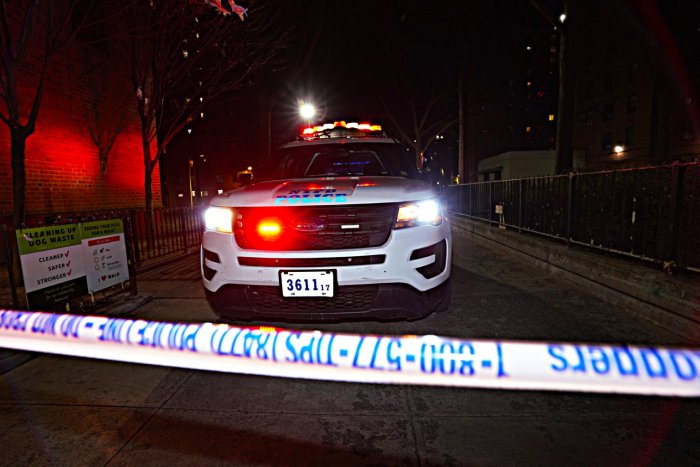By Jerry Tallmer
Parsifal, the pure fool, the holy fool, more out of Tolstoy and Dostoevsky than the mists of Gothic Spain or, as it might seem, medieval Germania, enters with an Uzi slung over his shoulder.
We do not yet see the swan that the young warrior has callously slain, 600 years before Chekhov’s Konstantin Treplev, or before Tchaikovsky, for that matter. We see an Ostrich. The Ostrich speaks.
OSTRICH: I’m sure you have some feelings despite the evident barbarism of your upbringing.
YOUNG MAN (i.e., Parsifal): I’m not good at talking. Perhaps I am retarded … I have never known the need to be different. Should I be different? …
OSTRICH: Once I explained. But I have changed. The explanations died. I have more to learn than to impart.
YOUNG MAN: What is … died?
OSTRICH: Foolish boy. What is that? (Points to Uzi …) You try my patience.
YOUNG MAN: Oh, this. It’s nothing. In my country everyone has one.
Thus Susan Sontag’s take on her friend and colleague Robert Wilson’s two interpretations of Richard Wagner’s full-throated 1882 interpretation of Wolfram von Eschenbach’s 13th-century epic poem about a young Arthurian knight’s search for the Holy Grail.
And the Ostrich? How does she get in the act?
“That was a big issue for me,” said John Jahnke, using “issue,” like everybody else these days, when he meant problem or roadblock or the like. Jahnke (pronounced Yonkee) was stealing a few minutes during the dinner break of the tech rehearsal of the production of Sontag’s “A Parsifal” that’s on stage under his direction at P.S. 122 through this Sunday, March 5.
“I latched onto two things,” he said of the Ostrich. “One, Robert Wilson used ostrich costumes in his ‘Life of Josef Stalin,’ which I did not see because I was a tot. Two, an ostrich is the symbol for both a harsh mother and the Immaculate Conception. A harsh mother who allows its child, the egg, to hatch on its own.”
Sontag gives no clues, not at least in the six short pages — count ’em, six, no more, no less — of “A Parsifal,” a play by her in two scenes that also includes the stage direction: “(Enter one hundred knights in black armor, most with faces covered).”
An all-but-forgotten, all but lost work by her; it was Jahnke who found it, snuffing around three and a half years ago, in Housing Works, a thrift-store-cum-bookshop on Crosby Street just below Houston.
“I saw a shelf marked Unusual Books, reached up, and pulled down a copy of a literary biannual called Antaeus. I thought: ‘How Greek!’ Opened it to, believe it or not, this thing of Sontag’s. At that time I was rehearsing my own ‘Shady Ladies of Haiti’ at Walker Space, and was using music, oddly enough, from Wagner’s ‘Parsifal.’ The magazine was $3.50. I bought it, took it home, started reading her ‘Parsifal’ in bed, and thought: What the hell is this?”
Too busy to hang in on it, he put Antaeus and ‘A Parsifal’ away. Six months later he took another crack at it — “and again I thought: What the hell is this?”
Susan Sontag died at 71 in December 2004.
“That spiked my interest, and I started reading her books, especially ‘Illness as Metaphor’ and ‘AIDS and Its Metaphors’ ” — two works that would seem to Jahnke (and to the present writer) to have a direct bearing on “A Parsifal.”
No, John Jahnke never met Susan Sontag.
“But I once almost met her, at a show in a warehouse on 16th Street — Reza Abdoh’s ‘A Ruined City’ — when it was 32 degrees with space heaters everywhere. Sontag was there with Annie Liebowitz [her photographer girlfriend]. I stood next to her and her glorious hair.”
Yahnke hasn’t yet met director-choreographer-designer-everything Robert Wilson either, but he did talk with him over the phone to Paris.
“He told me he had actually asked Sontag to write an introduction for the catalogue of an exhibit of his at the Boston Museum of Fine Arts in 1991, but what she’d written was a play — this play. So that was where it was first printed.”
Getting the rights to stage ‘A Parable’ was a Holy Grail in itself. Antaeus is gone. Echo Press, which published it, is gone. Jahnke finally communicated with Sontag’s son David Rieff.
John Jahnke is of Prussian stock himself. The son of a civil-engineer father and schoolteacher mother, he was born April 4, 1965, in Milwaukee, Wisconsin; has four sisters; was “one of those kids who did a lot of summer stock, like ‘The Wizard of Oz’ with Stubby Kaye as the Cowardly Lion and Nancy Kulp as the Wicked Witch”; studied opera at the California Institute of the Arts; came to New York in 1998; founded his own Hotel Savant theater company; has written a bunch of plays; lives in Chelsea.
Okay, Mr. Jahnke. What about those 100 knights in black armor? (Robert Wilson did ‘Parsifal’ with a mere 60 knights, scattered throughout the audience, à la the famous Orson Welles-John Houseman bootleg performance of “The Cradle Will Rock.”)
“Even 50 knights would be an impossibility in this production,” Jahnke said. “So we settled on an even dozen.” And the Ostrich? “Well, she wears a lot of feathers. It’s more a Ziegfeld girl. Had to be careful not to push it into camp.”
Matter of fact, wasn’t it Sontag who had some thoughts on camp? Oh, well.




































